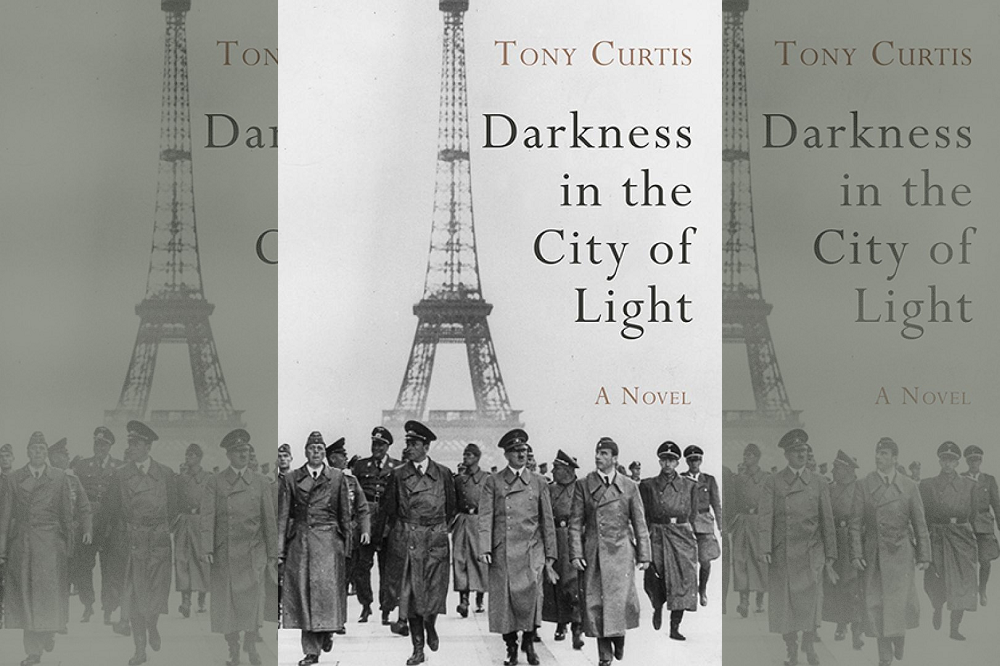Review: Darkness in the City of Light is a genre-defying new novel by Tony Curtis

David Llewellyn
The final days of the Third Reich have proven to be a rich seam of inspiration for writers and filmmakers in the decades since Hitler and his cohort exited the stage in a suicidal blaze of ignominy. Director G.W. Pabst, who had made two feature films under the regime, was the first to give us an onscreen “Fuhrer” in his 1955 film The Last Ten Days. It’s a story that’s been retold in versions featuring Alec Guinness, Anthony Hopkins, and – perhaps most successfully – Bruno Ganz as the murderous dictator.
A list of fictional and imaginative depictions of Nazism’s twilight might include Pasolini’s final and most controversial film Salo, or the 120 Days of Sodom, in which de Sade’s tale of depravity is transposed to the fascist puppet state in Northern Italy. In Gunter Grasse’s epic novel The Tin Drum the diminutive Oskar bears witness to the rise and inevitable fall of German fascism, while Hans Hellmut Kirst’s novel The Night of the Generals and its 1967 adaptation starring Peter O’Toole, has three generals suspected of murder meet in Paris in the summer of ’44, as the “Tausendjähriges Reich” loses its grip on its westernmost province.
It was in this real-life diabolical milieu that the crimes of Marcel Petiot came to light. Posing as the saviour of those who wished to escape Nazi-occupied Paris – the Jews, Resistance fighters and criminals facing internment and much worse – he was in fact a serial killer, responsible for perhaps as many as 60 murders, poisoning those who sought his assistance and keeping their money and belongings for himself.
When some of the victims and their clothing and jewellery were found at a house belonging to him, Petiot’s defence was that he had been working with the Resistance, and that the bodies were those of traitors and collaborators. It was one he maintained right up until the end, but it convinced neither judge nor jury, and he was executed in May 1946.
Petiot, who went by various aliases, including Dr Eugene and Henri Valeri, is the focal point of Darkness in the City of Light, a genre-defying new novel by the poet Tony Curtis. This isn’t a simple retelling of the Petiot story, one that might sit comfortably on the True Crime or Holocaust-themed shelves of your local discount bookshop.
In breaking both moulds Curtis combines documentary elements with imaginary monologues, in prose and verse, and a cast of real-life characters, from famous names such as Picasso, Simone de Beauvoir and Lee Miller to the victims of Dr Petiot, who speak to the condemned man from beyond the grave during his final days and hours.
Deceit and disinformation
It was these verses I found most powerful, moments when the book touches most profoundly on the scale of the tragedy wrought by both Petiot and the genocidal regime that sent so many men, women and children to the internment camp at Drancy and finally the death camps of the east.
The doctor committed his crimes in an age of deceit and disinformation, surrounded by a cavalcade of crooks, murderers and thieves, both among the occupying forces and the local criminal underclass, and Curtis masterfully smudges the already blurred lines between fiction and fact.
A lesser book might have made an antihero of Petiot, but by giving voice to the witnesses and those who disappeared into the charnel house of 21 Rue le Sueur, Darkness in the City of Light often feels like a final act of restorative justice, long after Madame Guillotine meted out the judge’s sentence at Paris’s Prison de la Sante.
It is also a vivid, kaleidoscopic portrait of Paris before, during and immediately after its liberation. We encounter Nazis in the full grip of hubris, the gallows humour of cabaret performers in the city’s seedier nightclubs, and witnesses to Ernest Hemingway and Fred Astaire at the Ritz.
If Petiot isn’t our main character, then Paris certainly is, and Curtis paints a picture of it, much like the city itself, in various shades of grey, a character it maintained decades after its Nazi occupiers became the stuff of history books and movies. As the horrific events of November 2015 and the Notre-Dame fire of 2019 remind us, there is still much darkness in the City of Light.
Darkness in the City of Light by Tony Curtis is published by Seren Books and can be purchased here or at your local bookshop
Support our Nation today
For the price of a cup of coffee a month you can help us create an independent, not-for-profit, national news service for the people of Wales, by the people of Wales.






